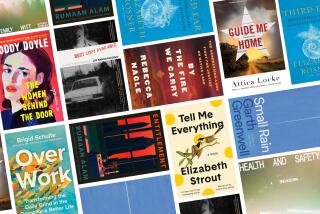Raising Kids, Yuppie-Style
- Share via
Martin Mull may have said it best: “Having a family is like having a bowling alley installed in your brain.”
Now, as a new wave of parents decide on just that option, the magazine that taught a generation of baby boom men how to select a blazer and mix a martini, has come through with a guide for those who have moved on to selecting diapers and mixing formula.
Every modern parent can relate to the premise behind Esquire’s “Bringing Up Daddy” guide in the November issue. Thirty years ago, parents had only Dr. Benjamin Spock to confuse them. Now there are entire sections of the bookstore labeled Parenting.
To help fathers and fathers-to-be contend with the overwhelming stock of information, Esquire’s editors have culled what they see as the wheat from the chaff and presented the best “wisdom “ about fatherhood in easily digested capsule form.
Along with snippets of philosophy from Mull and similar modern thinkers, the guide explores such questions as whether boys should play with guns and girls dolls; how long to wait before picking up a squalling infant; how much, if any, television viewing to allow; how to prevent a child from becoming a fatso, and what to tell a child about Santa Claus.
There is good reason to wonder at some of the information.
Any father who accepts, for instance, that mothers can take their little boys into women’s rooms but fathers can’t take their daughters into men’s rooms, as the magazine suggests, have probably let Esquire define their masculinity for too long.
On the other hand, the ruminations on the meaning of fatherhood are the sort of manly introspection Esquire does best.
For example, Dr. Spock (who commands more space in this article than any other expert, despite the spate of recent competitors) believes that “a boy’s sense of himself as a man is established at the age of three or four. He imitates his father’s actions and voice and the roles his father plays in the family and at work.”
Bertrand Russell is quoted as having observed, however, that “the fundamental defect of fathers is that they want their children to be a credit to them.”
Story Redux
Story magazine was launched in 1931, when the American short story was a popular and vital form of literature. For more than 30 years, it published some of the finest authors: Carson McCullers, John Knowles, Erskine Caldwell, Tennessee Williams, Truman Capote, William Saroyan, John Cheever and J. D. Salinger, among them.
Then folks lost interest in the short story, and, in 1967, Story went belly up.
This month, Richard Rosenthal, publisher of Writers Digest and several other publications, resurrects Story as a quarterly.
Lois Rosenthal, his wife, will serve as editor of the publication. Her credentials as an author--she has written the books “Living Better: A Guerrilla Guide to Getting the Most for Your Money” and “Partnering: A Guide to Co-Owning Anything From Homes to Home Computers”--might give some readers pause. Isn’t this the sort of nonfiction fodder that helped undermine the market for quality fiction?
But the premier issue should allay those fears. The new short stories, an entertaining and well-crafted mix by new and established writers, are bracketed by a “Story Classic” (in this case, Erskine Caldwell’s 1932 tale “Indian Summer”) and an excerpt from Norman Mailer’s new novel “Harlot’s Ghost.”
Readers can only hope the magazine is as successful today as it was in the glory days of short fiction, back in the 1940s, when Mailer won Story’s contest for college students with a piece of fiction titled “Greatest Thing in the World,” and Joseph Heller won its writing contest for servicemen.
Subscriptions are $17 for one year, from Story, P.O. Box 396, Morris, Ill. 61054. Telephone in Illinois, (800) 892-0753; outside Illinois (800) 435-0715.
Adoption to Debut
Adoption, a bimonthly magazine dedicated to providing information on “all legal and ethical forms of adoption,” will make its premier with a November-December issue.
The publishers are gearing their magazine to the estimated 2 million American couples who foster hopes of adopting a child.
Each issue, the magazine will present case studies of successful adoptions, feature articles on the mechanics of adopting and topics such as legal issues and birth-mother rights, child-rearing advice and a National Adoption Directory, listing agencies, lawyers and adoption specialists.
Subscriptions are $30 a year, from Adoption, P.O. Box 8551, Bartlett, Ill. 60103; (800) 833-3460.
Dishing the Dirt
With Zsa Zsa heading for the slammer, the juiciest courtroom gossip may emerge from the trial of accused madam Alex Adams. The November Vanity Fair is already dishing the dirt, with a profile of Adams guaranteed to send chills through former clients who may have wondered how discreet Adams would be.
Judging from this profile, not very.
Adams says that she told her call girls: “This buys the singing lessons, the dancing lessons, the glossies. This is to help you pay for what your parents couldn’t provide. It’s an honorable way station--a lot of stars did this.”
More to Read
Sign up for our Book Club newsletter
Get the latest news, events and more from the Los Angeles Times Book Club, and help us get L.A. reading and talking.
You may occasionally receive promotional content from the Los Angeles Times.










